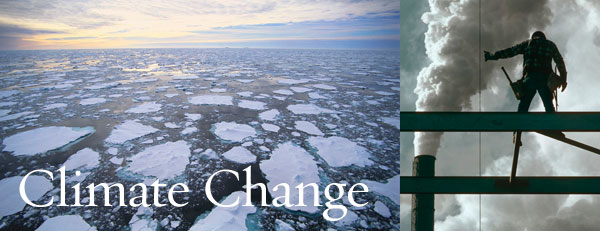The Climate Change

Climate change is already affecting our lives and the places we live, and has the potential to dramatically impact the lives of future generations.
The Nature Conservancy is joining with policy makers, community members, businesses, scientists, industry leaders and others to slow the pace of climate change. We work to reduce the accumulation of heat-trapping gases in the atmosphere and help natural areas adjust to the impacts of climate change.
If we don’t act now, we will leave a much larger problem to our children. The good news is that, if we all join in to stop climate change, we can reduce its impact on our lives, on our environment and on future generations.
Conservation: What You Can Do To Help
Discover Helpful Tips
 TIP: Travel light. Walk or bike instead of driving a car. Cars and trucks run on fossil fuels, which release carbon dioxide into the atmosphere. In the United States, automobiles produce over 20 percent of total carbon emissions. Walk or bike and you’ll save one pound of carbon for every mile you travel.
TIP: Travel light. Walk or bike instead of driving a car. Cars and trucks run on fossil fuels, which release carbon dioxide into the atmosphere. In the United States, automobiles produce over 20 percent of total carbon emissions. Walk or bike and you’ll save one pound of carbon for every mile you travel.
 TIP: Teleconference instead of flying. For office meetings, if you can telephone or videoconference, you will save time, money, and carbon emissions. Airplanes pump carbon emissions high into the atmosphere, producing 12 percent of transportation sector emissions.
TIP: Teleconference instead of flying. For office meetings, if you can telephone or videoconference, you will save time, money, and carbon emissions. Airplanes pump carbon emissions high into the atmosphere, producing 12 percent of transportation sector emissions.
 TIP: See the light. Use compact fluorescent light bulbs. These energy-efficient bulbs help fight climate change because they reduce the amount of fossil fuels that utilities burn. You will save 100 pounds of carbon for each incandescent bulb that you replace with a compact fluorescent, over the life of the bulb.
TIP: See the light. Use compact fluorescent light bulbs. These energy-efficient bulbs help fight climate change because they reduce the amount of fossil fuels that utilities burn. You will save 100 pounds of carbon for each incandescent bulb that you replace with a compact fluorescent, over the life of the bulb.
 TIP: Recycle and use recycled products. Products made from recycled paper, glass, metal and plastic reduce carbon emissions because they use less energy to manufacture than products made from completely new materials. For instance, you’ll save two pounds of carbon for every 20 glass bottles that you recycle. Recycling paper also saves trees and lets them continue to reduce climate change naturally as they remain in the forest, where they remove carbon from the atmosphere.
TIP: Recycle and use recycled products. Products made from recycled paper, glass, metal and plastic reduce carbon emissions because they use less energy to manufacture than products made from completely new materials. For instance, you’ll save two pounds of carbon for every 20 glass bottles that you recycle. Recycling paper also saves trees and lets them continue to reduce climate change naturally as they remain in the forest, where they remove carbon from the atmosphere.
Get The Facts About Climate Change
 FACT: Average global temperatures increased by about 1 degree Fahrenheit over the 20th century.
FACT: Average global temperatures increased by about 1 degree Fahrenheit over the 20th century.
 FACT: The United States contains only 5 percent of the world’s population, but contributes 22 percent of the world’s carbon emissions.
FACT: The United States contains only 5 percent of the world’s population, but contributes 22 percent of the world’s carbon emissions.
 FACT: Between 20 and 25 percent of carbon emissions come from deforestation and land use change.
FACT: Between 20 and 25 percent of carbon emissions come from deforestation and land use change.
 FACT: The Golden Toad (Bufo periglenes) is thought to be the first species to go extinct because of climate change.
FACT: The Golden Toad (Bufo periglenes) is thought to be the first species to go extinct because of climate change.
 FACT: Personal cars and trucks in the United States emit 20 percent of the United States' carbon emissions.
FACT: Personal cars and trucks in the United States emit 20 percent of the United States' carbon emissions.
 FACT: Air conditioning and heating account for almost half of electricity use in the average American home.
FACT: Air conditioning and heating account for almost half of electricity use in the average American home.
 FACT: Climate change is linked to stronger hurricanes, more drought and increased coral deaths from bleaching.
FACT: Climate change is linked to stronger hurricanes, more drought and increased coral deaths from bleaching.
 FACT: Climate change is linked to an increase in disease-carrying pests that lead to the increased spread of diseases such as dengue fever, malaria, lyme disease and West Nile virus.
FACT: Climate change is linked to an increase in disease-carrying pests that lead to the increased spread of diseases such as dengue fever, malaria, lyme disease and West Nile virus.

